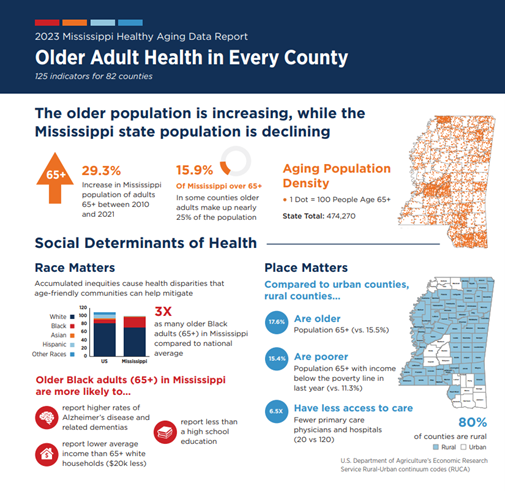What’s Public Health Got to do with… Academic Partners and the Age-Friendly Ecosystem?

One of the public health sector’s most valuable, yet often overlooked, partners in supporting healthy aging is academia. Colleges and universities, including staff, researchers, and students, can be great partners in bridging research and practice and offering a wide array of knowledge and resources that are crucial tools for promoting older adult health and well-being. Notably, the Academia is even listed as a crucial partner in the World Health Organization’s definition of the Age-Friendly Ecosystem.
Academia has and continues to be a source of innovative research on policies and programs that improve equitable opportunities for healthy aging. In 2017, the University of Michigan launched the National Poll on Healthy Aging, a bi-annual, nationally representative survey that gathers the perspectives of American older adults on issues like health care access, health policy, and other aging- and health-related challenges. In its first five years, data from the National Poll on Healthy Aging has produced 46 reports and 27 peer-reviewed publications. These reports cover a wide variety of topics, ranging from brain health and prescription drugs to aging-in-place and saving for healthcare expenses. This expansive reach is crucial for promoting the importance of older adult health and well-being to new and existing partners.
The University of Massachusetts Boston has also played an important role in advancing healthy aging through partnerships with state and community-based organizations and governmental agencies to develop older adult data profiles. The first of these was the development of the Massachusetts Healthy Aging Data Report in 2014. This report tracked nearly 100 healthy aging indicators in every city and town in Massachusetts, ultimately creating 367 community profiles that highlight key challenges facing the older adult population in the state and have been used to create more equitable opportunities for healthy aging for all through policy and programmatic changes.

As part of TFAH’s Age-Friendly Public Health Systems work, the Mississippi State Department of Health also partnered with UMass Boston to develop the Mississippi Healthy Aging Data Reports, providing a comprehensive set of data for all 82 counties in the state. The Gerontology Institute at UMass Boston has also published a number of equity-focused reports in recent years, with a particular focus on social determinants of health, financial security, and long-term supports and services.
Similar to the two examples previously noted, the Age-Friendly University Global Network was created in 2012 with the goal of “promoting positive and healthy aging.” More specifically, the network seeks to enhance the lives of older adults through “educational programs, research agendas, curriculum development, online education,” and more. Today, the Age-Friendly University Global Network has member universities in all five WHO regions, with membership rapidly growing in North America.
One of the principles of the Age-Friendly University Global Network is to ensure that universities’ research agendas are “informed by the needs of an aging society.” In other words, the network seeks to prioritize the challenges and opportunities for supporting healthy aging in the context of the increasingly older American population.
By aligning the efforts of the Age-Friendly University Global Network with the larger goals of both Age-Friendly Public Health Systems movement and the public health sector at large, the important impact that collaboration between public health and academia can have on older adult health and well-being will become clearer to both new and existing partners. Moreover, enhanced alignment between public health, academia, and aging services will result in more effective, actionable research outcomes that create change through policy and programming.